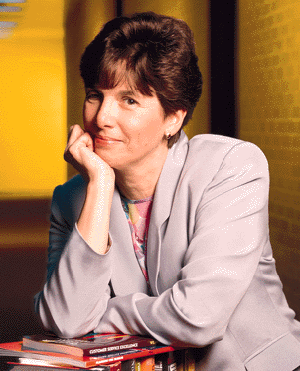Mending D.C. Public Libraries: Molly Horst Raphael '67

By Ted Gest '68
Photograph by Katherine Lambert
For many Americans the District of Columbia government evokes an image of a financially troubled, politically corrupt regime. There is more than a grain of truth in that description {the city is managed by a "control board" set up by Congress}, yet some parts of its apparatus are flourishing. Molly Horst Raphael '67 runs one of them-the D.C. public library system. Last February, following nearly 28 years in a wide variety of jobs in the capital's libraries, the alumna was named director of the District of Columbia Public Library.
Raphael's ride to the top wasn't exactly smooth. The D.C. libraries, viewed as a responsible agency, faced service cuts in the 1990s resulting from a static budget. Libraries that had been open six evenings per week in the 1970s were down to one night. "We were as close to the bottom as we could get," Raphael says.
Just prior to stepping up as acting director in 1997, Raphael discovered that the libraries had underspent their budget the previous year by nearly $1 million because of massive procurement problems. Even a local citizens group of library "friends" criticized the administration. Many managers might have been discouraged, but Raphael untangled the mess and won the top job-just in time for a June cover story in the Library Journal trade publication and the national meeting of the American Library Association in Washington.
The daughter of Paul and Dorothy Osborn Horst, both '33, Raphael was acquainted early with library work because of her mother's job at the Cleveland Public Library. Destined, perhaps, to follow in mom's footsteps, Raphael's own academic interests in psychology and art history were not to evolve into a career. After graduation, she moved to Boston with her husband, Ted Raphael '67, but was unable to find work in an art institution for lack of a graduate degree. She returned to school and, with the hope of entering the art-history world, obtained a master's degree in library science at Simmons College. After a move to Washington in 1970, she instead landed a job as a children's librarian in a D.C. branch library.
Recognizing Special Needs
A relationship in the mid-1970s with a deaf colleague spurred Raphael's interest in developing better library services for the hearing disabled. Unlike services for the blind, the subject had largely been ignored on the false assumption that deaf people needed no special help. Raphael enrolled in sign language classes and worked to spread the word among librarians that special training-including the principles of using English as a second language-would help them communicate better with the deaf. She then organized the first Deaf Awareness Week in any public library.
While organizing an ALA conference and heading a committee on the issue, Raphael became acquainted with national library leaders. She worked in a variety of senior D.C. administrative jobs in the 1980s and early 1990s, which gave her a command of budget and operations details that stood her in good stead when the directorship opened this year.
Among the woes facing Raphael was a technology deficit. A colleague who was training at the Microsoft Corp. at Washington State helped Raphael seek support from Microsoft's Bill Gates who had previously assisted libraries in Seattle. Having initially learned that D.C. would receive 16 computer terminals, Raphael was stunned to read a Microsoft press release that promised $1 million-enough for 83 Internet terminals at ten sites. Gates visited D.C. to announce the grant with Raphael and other officials.
Raphael founded a Web site (www.dclibrary.org) and may win a budget increase to offer evening library hours twice a week. Still, the library staff remains low-400 employees-compared with the staff of 625 which Raphael joined in the early 1970s.
Throughout her early months as director, Raphael has worked diligently to improve community relations in an atmosphere of a city government under siege. Results of a survey sponsored by the control board showed the library as receiving the highest public approval rating of any D.C. agency, yet just 51 percent of citizens rated it excellent or good.
"The library has always been an important part of the community," says Raphael, adding that in cities with high minority populations, the public libraries have generally enjoyed good will because they have been desegregated. Still, she is disappointed that citizens paid fewer visits to D.C.'s 27 library facilities in 1997 than in 1992.
Today, Raphael is driven in part by a desire to make a "positive contribution to society" in the same spirit as the strong interest in civil rights that pervaded Oberlin during her college days in the mid-1960s. She encourages colleagues to "look for other kinds of rewards" beyond their paychecks, citing her own work with the programs for the deaf. "You have to be willing to give some of yourself to extra projects," she says. "It can be an enriching experience."
Oberlin remains high on Raphael's list of places to benefit from those extra projects. Molly and Ted headed the class of '67 gift committee at their 25th reunion in 1992 and took part in the '67-'68-'69 cluster reunion last May. Molly is now working with library director Ray English in planning a symposium next fall of Oberlin alumni who work in the library field.
TED GEST is the senior editor of U.S. News and World Report and is a 1968 class agent with the Oberlin Alumni Association.